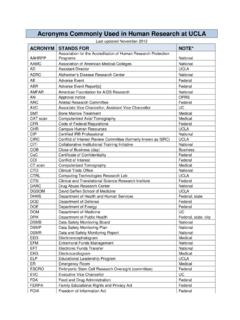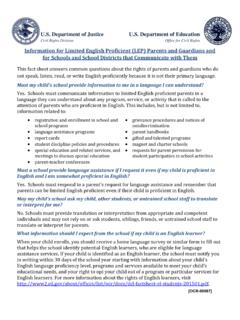Transcription of Guidance and Procedures: Child Assent and Permission by ...
1 Child Assent and Permission by parents or Guardians AARRPP Elements: , , Page 1 of 9 Guidance and procedures : Child Assent and Permission by parents or Guardians (last updated June 9, 2016) Overview How Does Assent Differ From Consent Process for Obtaining Child Assent and/or Parental/ guardian Permission Assent from Children or Minors Permission from parents or Guardians Documentation of Assent and/or Parental Permission Children Under 7 Children 7 12 Adolescents 13 - 17 Re- Assent and Consent at Youth and Adult Milestones Waiver of Child Assent Waiver of Parental Permission Legal Exceptions Permitting Certain Minors to Consent Emancipated Minors Self-Sufficient Minors Minors 12 Years or Older Exceptions Outside of California References Overview Research with
2 Children involves more complex considerations with respect to assuring the voluntary participation of research participants than research with adults. As described below, there are issues of Assent , consent, and parental permissions that must be considered. Federal regulations do not provide many specifics but they do include parental Permission requirements, also discussed below. The Federal regulations also charge that adequate provisions [be] made for soliciting the Assent of the children, when in the judgment of the IRB the children are capable of providing [taking] into account the ages, maturity, and psychological state of the children involved [45 CFR ].
3 How Does Assent Differ from Consent? Though children do not have the legal capacity to consent to participate in research, they should be involved in the process if they are able to Assent by having a study explained to them and/or by reading a simple form about the study, and then giving their verbal choice about whether they want to participate or not. They may also provide a written Assent if they are older. Circumstances in which a Child 's Assent may be unnecessary or inappropriate are discussed below under Waiver of Child s Assent . Process for Obtaining Child Assent and/or Parental/ guardian Permission The Process The process for obtaining oral and/or written consent for children and minors is similar to that of obtaining consent for adults.
4 An effective informed consent process involves at minimum these elements: Child Assent and Permission by parents or Guardians AARRPP Elements: , , Page 2 of 9 Conducting the process in a manner and location that ensures participant privacy, Giving adequate information about the study in a language understandable to the participant, Providing adequate opportunity for the participant to consider all options, Responding to the participant s questions, Ensuring the participant has understood the information provided, Obtaining the participant s voluntary agreement to participate, and Continuing to provide information as the participant or research requires.
5 A complicating factor for the children and adolescents Assent is the requirement to also consider parental Permission discussed below. Assent from Children or Minors Researchers should carefully consider and propose adequate provisions for obtaining the Assent of children prior to their participating in research. The IRB application should address whether the intended subject population of children would be capable of understanding the nature of their participation in the research, and if so, whether or how Assent will be obtained. In determining whether children are capable of assenting, the ages, maturity, and psychological state of the children involved should be taken into account.
6 This determination may be made for all children and adolescents to be involved in research under a particular protocol, or for each Child , as appropriate. An Assent process that takes into account the Child s experience and level of understanding, assures an element of cooperation and a feeling of inclusion on the part of the Child , and also illustrates the investigator s respect for the rights and dignity of the Child in the context of research. Out of respect for children as developing persons, they should be provided with essential information and asked whether or not they wish to participate in the research, particularly if the research: (a) does not involve interventions likely to benefit them; and (b) the children can comprehend and appreciate what it means to be a volunteer for the benefit of others.
7 Permission from parents or Guardians Adequate provisions must also be made for soliciting the Permission of each Child 's parents or legally authorized representative or guardian , as noted below. At a minimum, the federal requirements for consent indicated below must be met. However, the researcher or the IRB may determine that more stringent requirements are appropriate. Regulatory Category of Permitted Research with Children One Parent s or Both parents Permission Required? Minimal Risk (45 CFR , 21 CFR ) One parent/legal guardian may be sufficient Greater than Minimal Risk, Direct Benefit to Subject (45 CFR 21 CFR ) One parent/legal guardian may be sufficient but IRB must determine whether one or two is required Greater than Minimal Risk, No Direct Benefit to Subject, but Likely to Yield Generalizable Knowledge about Subject s Condition (45 CFR 21 CFR ) Both parents /legal guardians, unless one parent is deceased, unknown, incompetent, not reasonably available, or does not have legal responsibility for the custody of the Child .
8 Greater than Minimal Risk, No Direct Benefit to Subject, but Results May Alleviate Serious Problems of Children s Health or Welfare (45 CFR 21 CFR ) Both parents /legal guardians, unless one parent is deceased, unknown, incompetent, not reasonably available, or does not have legal responsibility for the custody of the Child . Child Assent and Permission by parents or Guardians AARRPP Elements: , , Page 3 of 9 When One Parent s Permission Is Sufficient For research that falls into risk-benefit Category 1 [45 CFR 21 CFR ] or 2 [45 CFR 21 CFR ], the IRB may determine that Permission from only one parent is sufficient.
9 The Committee will find that Permission of one parent is sufficient unless the nature of the study seems likely to provoke disagreements about participation among two parents , in which case Permission from two parents may be required unless one parent is deceased, unknown, incompetent, not reasonably available, or does not have legal responsibility for the custody of the minor. Research that falls into Category 3 [45 CFR 21 CFR ] or 4 [45 CFR 21 CFR ] requires Permission from both parents , unless one parent is deceased, unknown, incompetent, not reasonably available, or does not have legal responsibility for the custody of the Child [45 CFR or 407, 21 CFR (e)].
10 IMPORTANT NOTE: When there is only one living parent or guardian or one parent has sole custody after a divorce, the investigator may determine that single-parent or single- guardian Permission is sufficient. When parents Disagree If there are two parents available to give Permission but they disagree about allowing their Child to participate in the study, the Child may not be enrolled unless that disagreement can be resolved. This applies to all permissible categories--even if only one parent s signature is required, when both parents are involved in the decision, they must agree for the Child to be enrolled.











